Letter from a Reader 1.10.25
Great stories about California wildfires show you how to write about disasters without clichés, melodrama, or sentimentality
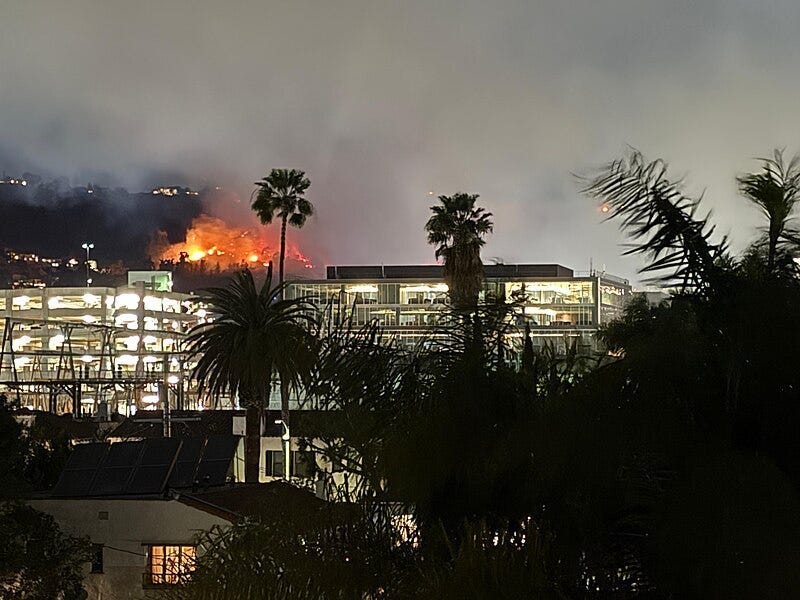
Five years ago, Hurricane Sally tore through my town after making landfall as a Category 2 storm with wind speeds of 105 miles per hour. A live oak tree crashed into a house across the street, slicing it half.
The storm knocked out power in town for five days, and as we waited for the lights to come back on, a neighbor and I talked about an obvious question: Why hadn’t we received an evacuation order? It wasn’t as though nobody understood the risks of hurricanes. Katrina had ripped up a long concrete pier in the center of town.
My neighbor and I are both journalists who follow the news, and we were sure we hadn’t been told to leave. As we spoke on the phone, she searched online for why the town had sent no evacuation notice. She was startled by what she found.
“You won’t believe this,” she said. “There was an evacuation notice for us. But the evacuation was only ‘recommended,’ not ‘mandatory.’ ”
It turned out that the local authorities hadn’t advised everyone to leave, only people who lived on or near the water, as my friend and I did. And you had to go to the town website or Facebook page or call to find out if you were in an evacuation zone for our worst storm in more than a decade.
Our experience suggests a challenge facing Los Angeles as wildfires rage. How do you protect people without clearing out an entire city?
Why wildfires are ‘good copy’
Wildfires make for what reporters used to call “good copy,” back when there were newspapers. As a book critic, I’ve found that they can inspire better books than other natural disasters.
Tornadoes and flash floods arrive so suddenly that writers may have little a chance to build a strong narrative arc around their arrival. Hurricanes are so common in my region that they inspire sheaves of clichés involving “hunkering down” during storms that “sound like a train” or “feel like something out of a movie.” That doesn’t count the sentimentality and melodrama that can infect writing about any natural disaster.
Perhaps those facts help to explain why good books about wildfires are so memorable. Here are a few of my favorites about California fires that stand out for their high-quality reporting and vivid lessons in what can go wrong.
‘The weather of catastrophe’
The book: Slouching Towards Bethlehem (Farrar, Straus & Giroux, 1968)
The author: Joan Didion
No one has written better than Didion about that gangster wind, the Santa Ana. Dry and gusty, it’s been driving the Los Angeles wildfires with speeds that can reach 100 miles per hour.
Didion caught part of its essence in “The Santa Anas,” a section of the essay “Los Angeles Notebook” in her trailblazing collection of New Journalism, Slouching Towards Bethlehem. Her reflections on the wind comprise a small portion of the book, fewer than 700 words, but nothing I’ve read describes the effects of a Santa Ana more memorably. Didion writes:
“Los Angeles weather is the weather of catastrophe, of apocalypse, and, just as the reliably long and bitter winters of New England determine the way life is lived there, so the violence and the unpredictability of the Santa Ana affect the entire quality of life in Los Angeles, accentuate its impermanence, its unreliability. The wind shows us how close to the edge we are.”
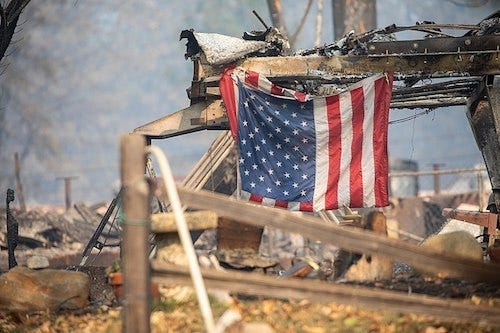
A tinderbox among the ponderosa pines
The book: Paradise: One Town’s Struggle to Survive an American Wildfire (Crown, 2021)
The author: Lizzie Johnson
Johnson, a Washington Post reporter, was working for the San Francisco Chronicle when she covered the 2018 Camp Fire that leveled Paradise, California. In this harrowing account, she melds first-rate reporting and sturdy analysis of the corporate and governmental missteps that fed the calamity in the foothills of the Sierra Nevada north of Sacramento.
Paradise, Johnson shows, was a tinderbox on a ridge that could leave people with no way out when a fire ignited. That’s essentially what happened in November 2018, when a high-voltage electrical cable hit the dry ground after a nearly 100-year-old iron hook snapped.
A state investigation blamed the disaster on the faulty equipment of Pacific Gas & Electric, and the utility pleaded guilty to 84 counts of involuntary manslaughter in the resulting deaths.
But Johnson shows that there was more to it than that. Within the preceding two decades, houses had burned in the nearby Poe and Humboldt fires and Paradise had developed a badly flawed evacuation plan.
As the Camp Fire spread, authorities were slow to issue evacuation orders, and more than 80% of residents didn’t get them. Evacuation routes became gridlocked, leaving people desperate for alternate ways out as the fire raged around them.
Paradise lacks the storytelling flair of disaster narratives by writers like Hampton Sides and Jon Krakauer, but Johnson has deservedly won a garland of journalism awards for her work. And the lessons of her book are many. One is that your dental records need to be stored on more than your dentist’s computer. The Camp Fire destroyed so many of those, the coroner hoped to identify bodies with the serial numbers on artificial hips, knees, and shoulders.
A football team with a scoreboard melted by fire
The book: Paradise Found: A High School Football Team’s Rise From the Ashes (Morrow, 2021)
The author: Bill Plaschke
One of America’s best sportswriters offers a font of inspiration for any team that needs to overcome vast odds to have a winning season.
After the Camp Fire destroyed almost everything in Paradise, California, except its high school football field, coach Rick Prinz thought he could help lift the spirts of a devastated town by not cancelling the next season of a sport that traditionally united residents.
But few football teams have faced worse odds. Players had fled a horrific blaze that killed 86 people and had scrambled to find new homes. Afterward they’d had to practice on a rock-studded field in Chico and a home field with a scoreboard partly melted by the inferno. The fire left some players with PTSD or other mental health challenges.
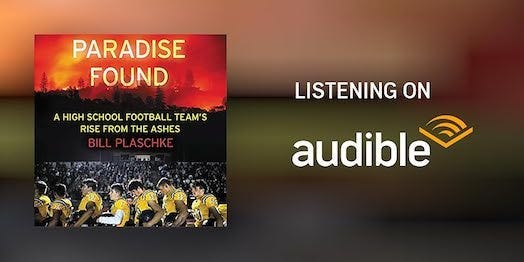
Incredible as it may seem, the team went on to have an undefeated regular season. But the players won their greatest victory off the field. Coach Prinz said before the season began that the town needed hope: “We’re going to be that hope.” There’s little doubt that for many residents, they were.
And keep in mind…
Two books I haven’t read have won praise for their portrayal of wildfires:
Fire Weather: A True Story from a Hotter World (Knopf, 2023) by John Vaillant). A Canadian-American journalist tells the story of what may have been, until the Los Angeles fires, the nearest wildfire counterpart to Hurricane Katrina. In May 2016 a fire engulfed the town of Fort McMurray in Alberta, Canada, the hub of the nation’s oil industry, forcing tens of thousands of people to flee their homes in one afternoon, and Vaillant casts it as a harbinger of disasters to come elsewhere in Fire Weather, a Pulitzer finalist that won the £50,000 Baillie-Gifford Prize for Nonfiction.
I Survived the California Wildfires, 2018 (Scholastic, 2020) by Lauren Tarshis. This graphic novel is the 20th in Tarshis’ popular “I Survived” historical fiction series for ages 8 and up. Each book focuses on a child who shows resilience in a crisis such as a the sinking of the Titanic, the San Francisco Earthquake, and Hurricane Katrina. I I’ve heard firsthand accounts of the horrors of Katrina from neighbors, but I still enjoyed and learned from Tarshis’ book about it.
Jan Harayda is an award-winning journalist on the Gulf Coast. She has been the book critic for a large U.S. newspaper and a vice-president of the National Book Critics Circle.




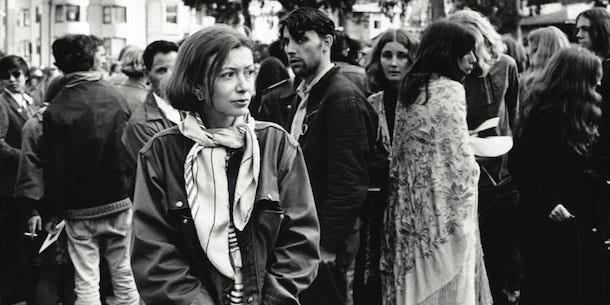
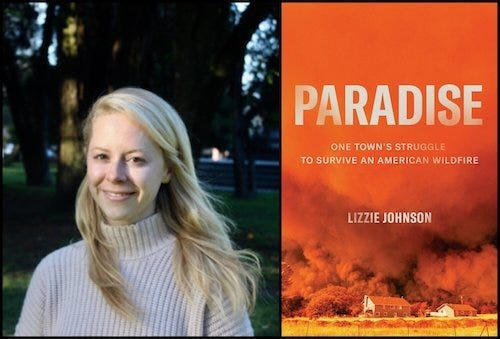
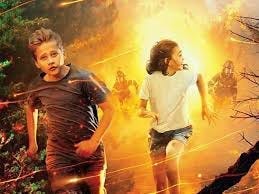
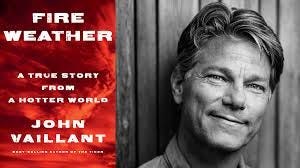
I appreciate this! I covered the 2003 Cedar Fire in San Diego and I've never been more terrified and exhausted on assignment. I am adding Lizzie Johnson's book to my TBR list. Even though my subject matter of mass incarceration is a man-made disaster, I am always looking for inspiration on how other writers corral reporting and writing on complex issues & events into a readable page turner. It sounds like Johnson's book will be a good example!
Condominium by John D. MacDonald is a pretty good hurricane novel